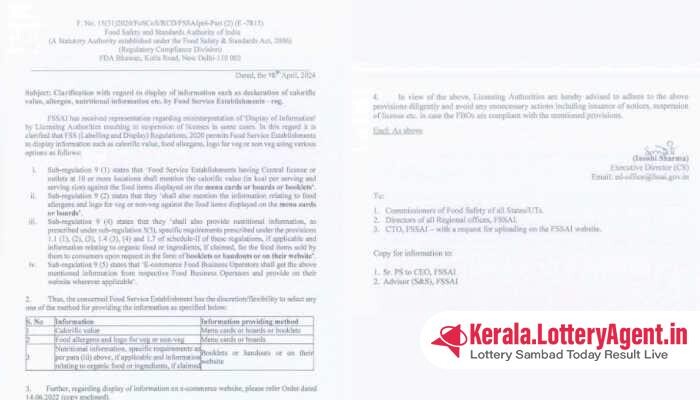
In the bustling capital of New Delhi, the Food Safety and Standards Authority of India (FSSAI) has taken proactive steps to correct a widespread misunderstanding among licensing authorities related to the ‘Display of Information’ guidelines, which has led to unwarranted suspensions of licenses for numerous food establishments across the nation. This clarification comes as a relief to the food industry, especially to those who were affected by these regulatory misinterpretations.
The issue at hand arose from an unclear application of the FSSI (Labelling and Display) Regulations 2020, which are designed to ensure that consumers have access to essential information regarding the food they consume. Such details include the calorific value of dishes, potential food allergens present, and clear markings to distinguish between vegetarian and non-vegetarian offerings. This information is vital for consumers to make informed choices, particularly for those with dietary restrictions or health concerns.
In a concerted effort to resolve these discrepancies, FSSAI issued a directive to all States and Union Territories (UTs), issuing a reminder of the intended flexibility in the regulations. The authority explained that the regulations were not meant to be rigid but rather allow food service establishments to present the required information in various ways. This could include anything from traditional menu labeling to digital displays or other innovative methods that ensure visibility and comprehension for patrons.
This intervention by FSSAI reflects a broader concern within the organization to maintain a balance between regulatory compliance and the practical realities of running food service businesses. It underscores the need for constant communication and education among regulatory bodies and the businesses they oversee. Ensuring this comprehension is critical to avoid the heavy-handed enforcement actions that were recently taken, which FSSAI now recognizes as disproportionate to the infractions.
The clarification comes against a backdrop of increased scrutiny on the food industry, as consumer awareness and demands for transparency have risen. People are more concerned than ever not just about the taste and price of their food but also about its nutritional content and safety. To this end, the FSSAI’s regulations are an attempt to align with global best practices, where similar information disclosure is becoming the norm.
In related news, FSSAI’s engagement with regulatory compliance was also seen in another recent development where the government directed e-commerce platforms to remove Bournvita from their ‘Healthy Drinks’ section. This directive was based on ongoing efforts to ensure that marketing of food products on digital platforms conforms to nutritional assertions and public health guidelines.
The FSSAI’s correction and clarification efforts have been generally well received by the food service industry. Stakeholders understand the importance of accurate information display for consumer decision-making. However, they have expressed concerns about how misinterpretations of these regulations can potentially hurt businesses, especially smaller establishments that may have less capacity to absorb the disruptions caused by license suspensions.
Moreover, this incident has brought to light the importance of establishing clear guidelines and ensuring they are conveyed effectively to all relevant parties involved in the regulation and operation of food services. As the regulations evolve, FSSAI is expected to continue playing a crucial role in providing guidance, ensuring they are understood well and enforced sensibly to protect consumers while supporting the growth and innovation of India’s vibrant food industry.
The FSSAI’s proactive approach to rectifying these misunderstandings is a testament to the organization’s commitment to upholding its mission of ensuring safe and wholesome food for the populace while also being cognizant of the challenges faced by food service providers. It is a delicate balance, but one that is essential for the health of the nation and its economy. With clear communications and the cooperation of local authorities, FSSAI aims to ensure that its regulations are enforced in both letter and spirit.












